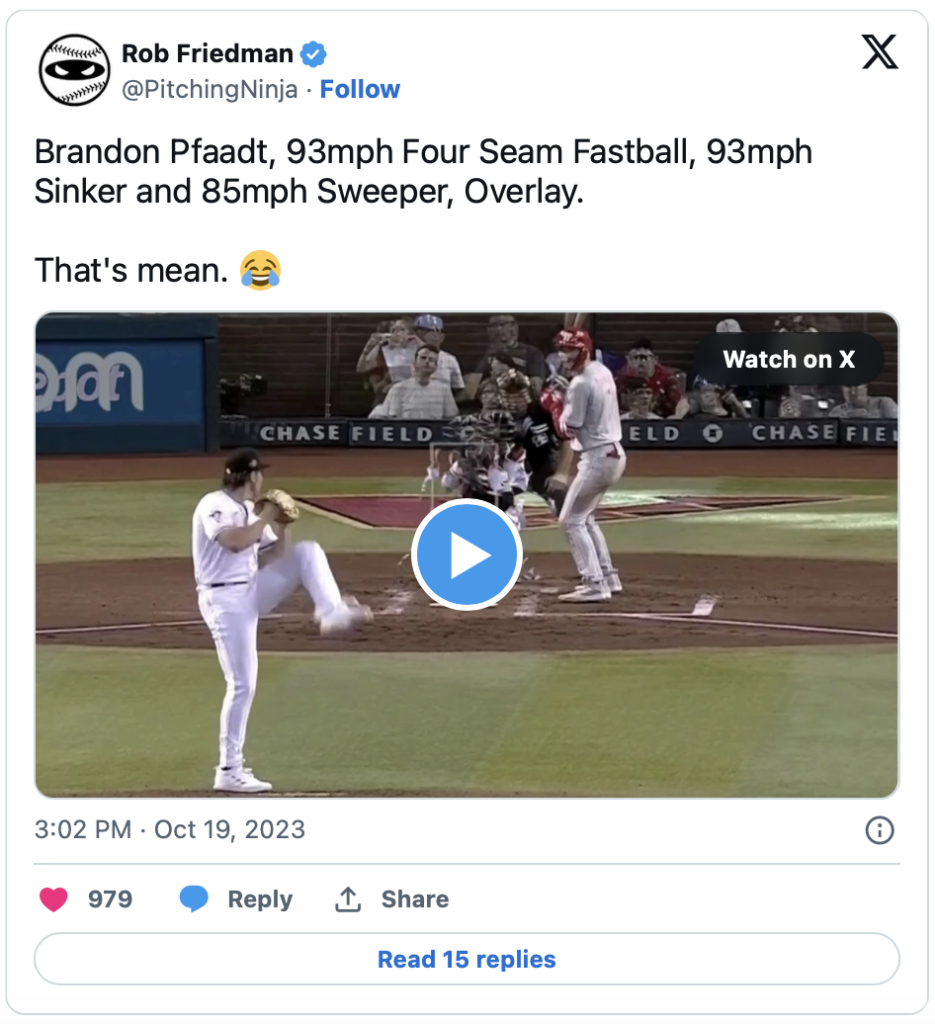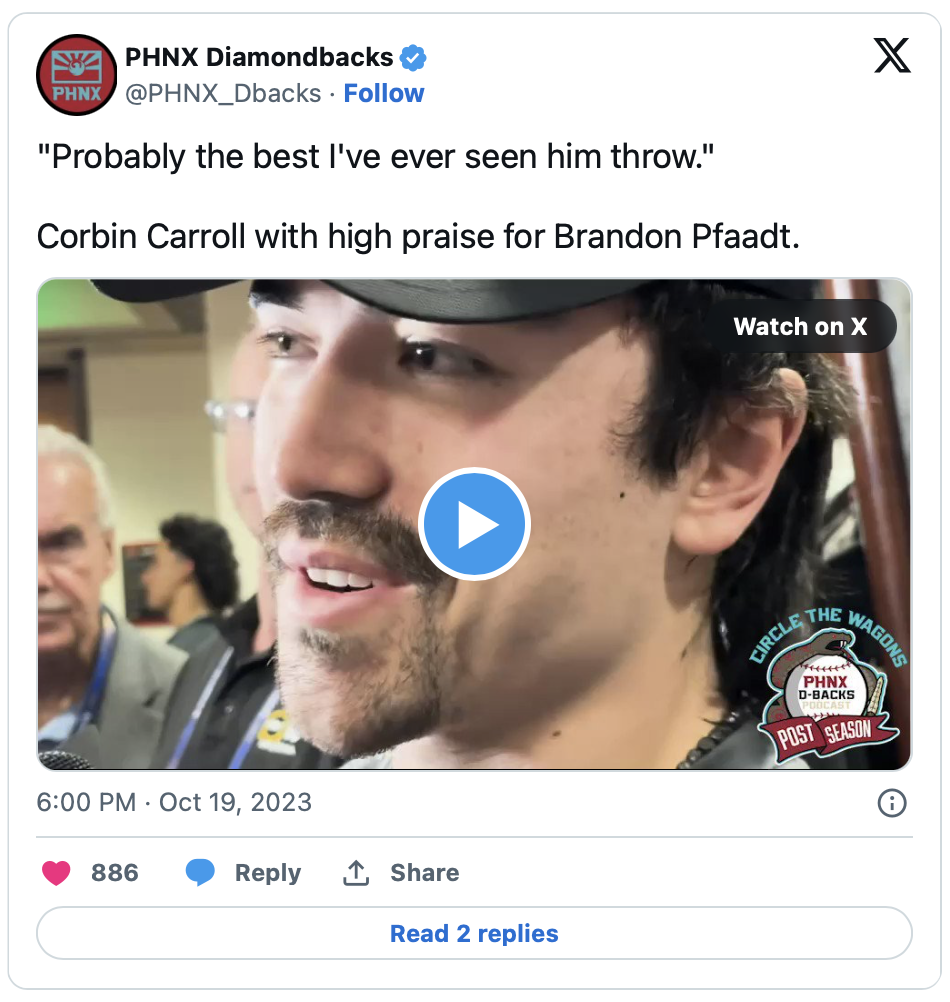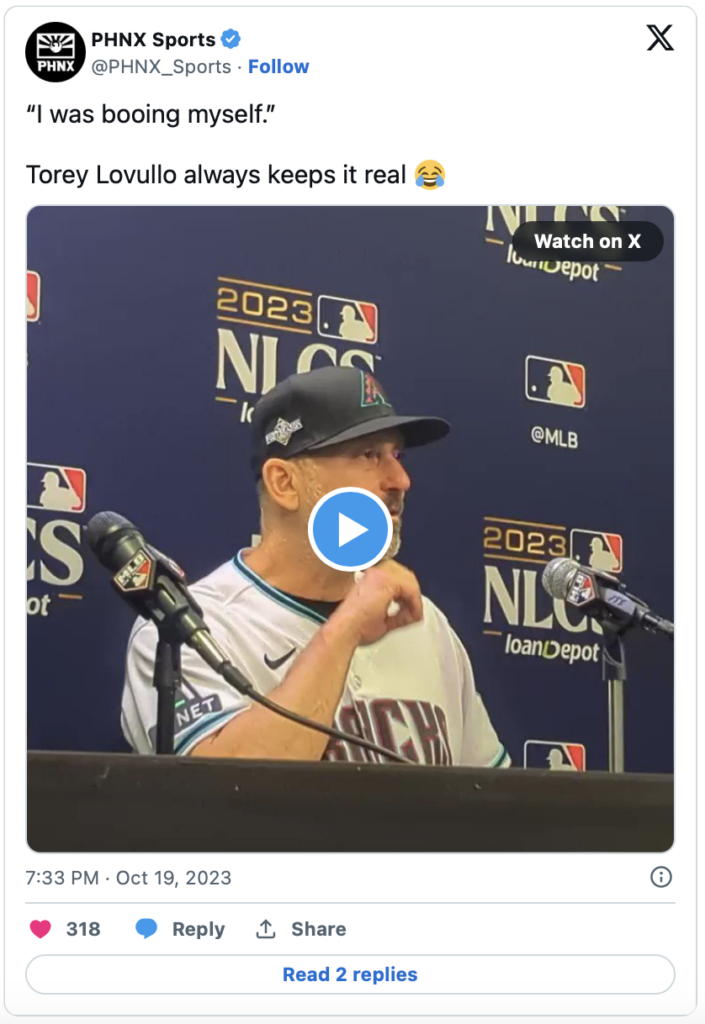© 2026 ALLCITY Network Inc.
All rights reserved.

When Diamondbacks manager Torey Lovullo walked up the dugout steps in the sixth inning of Thursday’s Diamondbacks-Phillies NLCS game, he knew he would not be well-received.
But, after consulting bench coach Jeff Bannister and pitching coach Brent Strom, he had already made up his mind.
“Am I an idiot if I take [Brandon Pfaadt] out of the game with nine strikeouts at five and two-thirds [innings]?” he’d asked them.
The vast majority of the 47,000-plus fans seemed to think so, as they rained a crescendo of boos down upon the Diamondbacks manager as he approached the mound to take the ball from his young righthander.
And, yet, that is the decision that Lovullo made.
“I’m sure I was the most unpopular guy in the city of Phoenix, in the downtown area and maybe in the entire state of Arizona,” he said after Thursday’s game. “I was booing myself as I walked out to the mound.”
The move was not only controversial because Pfaadt was in the middle of an inning with no runners on base. It was controversial because Pfaadt had only 70 pitches and did not seem to be wavering.
Count Diamondbacks outfielder Tommy Pham among those who disagreed with the move.
“I would have left [Pfaadt] in,” Pham said. “You don’t want to take out a guy like that with so much momentum on our side. Let him keep going.”
That Lovullo’s decision was controversial at all tells you all you need to know about how well Pfaadt pitched in front of more than 47,000 fans at Chase Field on Thursday afternoon in a pivotal Game 3 of the NLCS.
All playoff games are important, but, with the Diamondbacks down 2-0 in the series, this was a game they absolutely had to win. Only one team in MLB history — the 2004 Boston Red Sox — has ever come back from a 3-0 deficit in a seven-game series.
In a literal sense, the Diamondbacks won the game because of Ketel Marte, whose ninth-inning, walk-off single seemed like the perfect ending in a series that has seen very little production from the rest of the lineup.
But, perhaps even more so, the Diamondbacks won because 25-year-old rookie Brandon Pfaadt pitched the best game of his life, holding a lineup that had blasted 19 home runs and put up a ridiculous .940 team OPS through eight postseason games scoreless over 5 2/3 innings. He walked none, struck out nine and allowed only two hits.
Pfaadt became the fourth pitcher in Diamondbacks history to strike out nine in a postseason game, joining Brandon Webb, Curt Schilling and Randy Johnson. Based on his game score of 74, Pfaadt had the best postseason outing ever by a Diamondbacks pitcher not named Schilling or Johnson.

Pfaadt’s dominance could be felt from the moment he took the mound.
For his first pitch of the game, he dotted a sinker on the lower outside corner to Philadelphia Phillies leadoff hitter Kyle Schwarber. Schwarber took it for strike one.
Pfaadt then changed eye levels with a four-seamer at the top of the zone. Schwarber foul-tipped it into the mitt of catcher Gabriel Moreno. Strike two.
Then, Pfaadt dotted a sweeper at the knees that locked up Schwarber. Strike three called.
“Three Hall-of-Fame pitches,” said Ron Darling, color commentator on TBS’ broadcast of the game.
First innings have not been kind to the Diamondbacks in this series against the Phillies. In Game 1, Schwarber homered on the first pitch he saw from D-backs starter Zac Gallen. In Game 2, Trea Turner, the Phillies’ No. 2 hitter, homered off Merrill Kelly.
But on Thursday, Pfaadt faced the minimum. Trea Turner followed Schwarber’s strikeout with a soft single to right field, but Bryce Harper grounded into an inning-ending double play. Pfaadt threw just eight pitches in the frame.
After Phillies clean-up man Alec Bohm flew out to start the second inning, Pfaadt struck out six of the next seven batters he faced. When Lovullo emerged from the dugout to make that controversial pitching change in the sixth inning, Pfaadt had retired 10 consecutive Phillies hitters.
While Pfaadt’s outing was ultimately cut short due to Lovullo’s early hook, make no mistake: The Diamondbacks would not have won this must-win game were it not for Pfaadt’s brilliance. With his performance, Pfaadt not only carried the Diamondbacks to victory in their most important game of the year, but he continued to change the narrative surrounding what once appeared to be an underwhelming rookie season.

It might be hard to imagine after watching his Game 3 performance, but, yes, there was a world in which Pfaadt was not at all effective against major league hitters.
In his first stint in the majors from May 3 through May 26, Pfaadt posted an 8.37 ERA in 23 2/3 innings. Opposing hitters hit .316/.365/.653 against him in that span.
Perhaps Pfaadt’s stuff was not as good as his lofty prospect status promised, but the primary issue was how frequently he was missing over the heart of the plate.
After five starts, the Diamondbacks sent Pfaadt back down to Triple-A Reno to work out the kinks. They also gave him a message.
“Don’t stop,” Lovullo told him. “You’re going to come back here and help us win some really big baseball games. I promise you. That’s going to happen. You’re going to find your way into that role.”
On June 29, Pfaadt was called up once again, this time to face the Tampa Bay Rays, baseball’s best team at the time.
That start did not go well, either. Pfaadt gave up six runs on seven hits in just two innings. As usual, he threw plenty of strikes, but too many of them caught the middle of the plate.

After the game, the Diamondbacks sent Pfaadt down again.
At that point, Pfaadt had only six major league starts to his name — a drop in the bucket relative to a full major league career — but it was difficult to imagine those starts going any worse. Pfaadt had a 9.82 ERA in the majors.
Two weeks later came the All-Star break, and with it, Pfaadt returned home to Louisville, Kentucky, to spend time with his family. One night, he received an unexpected 11 p.m. phone call. It was Diamondbacks pitching coach Brent Strom.
“I was like, ‘What does he want?'” Pfaadt recalled.
In retrospect, Pfaadt says the phone call was “probably longer than it should have been,” but suffice it to say that Strom was eager to share an idea. He wanted Pfaadt to move from the third-base side of the rubber to the first-base side. In so doing, Strom hoped to add deception to Pfaadt’s pitches.
“He had a whole diagram of every single pitch on every side of the plate,” Pfaadt said. “It was funny.”
Pfaadt made the switch, and he received his next major league call-up shortly after on July 22. That first start back came on the road against the Cincinnati Reds, and it was arguably the best start of Pfaadt’s career. He tossed six innings, allowing three runs on four hits with six strikeouts.
From that game through the end of the regular season, Pfaadt posted a 4.22 ERA and 1.24 WHIP in 13 appearances (12 starts). He finished the year with a 5.72 ERA, but it was clear that Pfaadt was, at the very least, moving in the right direction.
On Thursday, less than four months to the day that Pfaadt was thrashed by the Rays, Pfaadt pitched like an ace against the hottest offense in baseball in Game 3 of the NLCS.
He did it because his stuff was working — primarily the four-seamer, sinker, sweeper — but he also did it because he was able to convince Phillies hitters to chase pitches out of the zone, something Strom emphasized when talking about Pfaadt before Thursday’s game.
“One of his greatest strengths is his strike-throwing ability,” Strom said. “I have always believed that if you can throw strikes, you can intentionally throw balls. The ultimate is to be able to throw pitches that are balls that people swing at.”
In Thursday’s game, Pfaadt did that about as well as he ever has.
Although Pfaadt threw just 41 percent of his pitches in the strike zone — his lowest mark ever in a major league start — 68.6 percent of pitches went in the books as strikes. It is amazing what getting hitters to chase pitches they shouldn’t can do.
On Thursday, Pfaadt induced swings on 43.9 percent of his pitches outside the zone. That is the second-highest mark of his major league career.
Generally, with more swings outside the zone comes more whiffs, and Pfaadt got a whole bunch of them. His 17 whiffs in the game were the most he has had in any major league start. For reference, Diamondbacks ace Zac Gallen exceeded 17 whiffs in only two starts all year.
Of those 17 whiffs, 12 came on fastballs (four-seamer or sinker) and five came on sweepers.
“Amazing,” shortstop Geraldo Perdomo said of Pfaadt’s outing. “Without him, we could do nothing today … This is the best start he’s had the whole season so far. I’m so proud of him.”
“Pfaadt put us on his back today,” first baseman Christian Walker added. “That was a hell of a performance.”
As for the decision to clip Pfaadt at 70 pitches, Lovullo said that the only scenario in which he would have left him in was if the Diamondbacks had a significant lead.

For as crazy as it might seem to remove a pitcher who was pitching as well as Pfaadt, it is not all that difficult to see why that decision was made. In the regular season, opposing hitters slashed .397/.413/.779 against Pfaadt the third time through the order. In three postseason outings, Pfaadt has yet to face any one hitter three times in the same game.
“Obviously, I’m a competitor,” Pfaadt said. “I want to keep going. Everybody does, but at the end of the day you just have to trust [Lovullo’s] decision and move forward, go to the bullpen, let them do their jobs.”
When all was said and done, the bullpen did indeed do its job, allowing only one run in 3 1/3 innings of work. The Diamondbacks went on to win the game, 2-1.
Entering the postseason, the Diamondbacks’ lack of starting rotation depth was widely seen as one of their biggest weaknesses. Their top two starters, Zac Gallen and Merrill Kelly, could only pitch in so many games. Pfaadt, in spite of his improved second half, was seen as something of a wild card in the playoffs.
With his 4 1/3 scoreless innings in the Diamondbacks’ Game 3 win over the Los Angeles Dodgers in the NLDS and his even more impressive 5 2/3 scoreless innings on Thursday, Pfaadt became the first pitcher in MLB history to toss back-to-back postseason outings with no walks or runs allowed.
For a pitcher whose first six major league starts were as rough as his, Pfaadt’s turnaround is a good reminder not to write off pitching prospects too quickly, no matter how ugly their first taste of the majors might look.
He can no longer change the 5.72 ERA stamped on next year’s baseball card, but, with his second-half improvements combined with an impressive showing in the playoffs, he suddenly looks like one of the better young starters in the game.
Follow Jesse Friedman on X (formerly Twitter)
Top photo: Rob Schumacher/The Republic
Get Arizona's Best Sports Content In Your Inbox!Become a smarter Arizona sports fan with the latest game recaps, analysis and exclusive content from PHNX's writers and podcasters!
Just drop your email below!
Comments
Share your thoughts
Join the conversation



